I hate portable air conditioners.
Hate is a strong word, but since this blog is G-rated, it’s all I can use. We’ve waged war against each other for over a decade. (I may have almost gotten into a fist-fight over a portable A/C, once.)
And now, I’m recruiting you to help defeat this foe, oh Mighty Reader.
A Portable Air Conditioner Is Not a “Real” Air Conditioner!
Let’s play a game: Word association. When I say, “air conditioner,” what do you envision?
- Turning down your thermostat and listening to your central A/C kick on?
- Playing freeze-out in your car on a 90-degree summer day?
Good. That’s what you should be thinking of. That’s what “real” air conditioners do.
Both your car and your home air conditioners operate on the basic refrigeration thermodynamic cycle of compressor-condenser-expansion-evaporator.
Scary Science Stuff (That We Won’t Talk About)
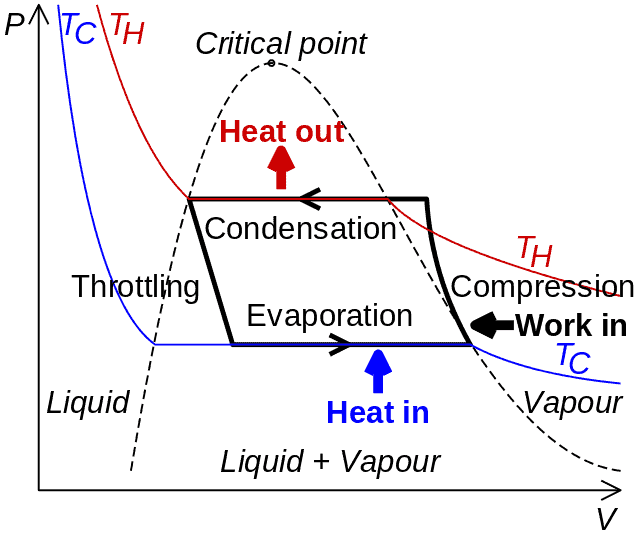
Don’t worry! That’s the end of my thermodynamics lecture. All you need to know is this:
Air conditioners MAKE HEAT.
“What?” you say. “Andy, you’ve been out in the sun too long! Air conditioners make cool air! That’s why I bought one!”
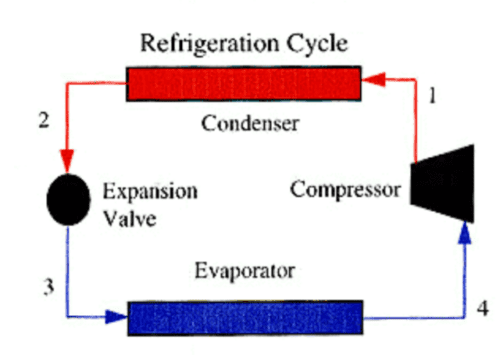
No! No they don’t! Once all is said and done, an air conditioner just moves heat around. It absorbs heat from your indoor air and releases it to the outdoor air. And in the process of doing that, it actually makes a little heat of its own!
If you leave a window air conditioner running in the middle of a sealed room, the room will get hotter.
No, it won’t get cooler first, and then hotter later. The moment you turn on that A/C, the room temperature will increase. Always.
That’s why your window A/C exhausts heat through the window, and your RV rooftop A/C exhausts heat above your roof. You don’t want that waste heat hanging around!
This can be hard to understand, so check out this helpful video:
How Does a Portable RV Air Conditioner Work?
Hint: It all comes down to humidity.
Now, hang with me, because we’re going to talk about several types of portable air conditioners. Just because a product says it’s an “air conditioner” doesn’t mean it works the same way as the one in your house!
Method 1: Evaporative Cooling
Ever hear of a redneck air conditioner?
Dump 20 lbs of ice in a cooler and duct tape a $12 box fan to the top. Wallah! – you’ve invented a redneck air conditioner.
Actually, it’s not an awful idea for a portable air conditioner for an RV.
Good Reason 1: The Ice Absorbs Heat
As the warm air moves across ice, the ice absorbs heat, making the air colder. The fan repeats this process continuously.
So long as the ice – or water, eventually – is colder than the ambient air, the air will continue to cool down. But the closer the two temperatures become, the slower the heat transfer.
Good Reason 2: …. (Is a Lot More Complicated)
Hold onto your pocket pencils and calculators.
When water transitions from liquid to gas, it absorbs energy. It literally sucks in heat from anything around it.
We nerds call this process the latent energy of evaporation.
That means if you spray a fine mist of water into dry air, it transforms into vapor. And it cools down the air around it! Pretty cool, huh? That’s why you enjoy walking into a cool mist on a hot summer’s day.
This type of air conditioning is called evaporative cooling. And unlike Good Reason # 1, it works even if the water and the air are the same temperature! —
— Well, mostly. Actually, if you really want to know how evaporative cooling works, you have to read a psychrometric chart.

Evaporative cooling, my friends, is exactly how all those desktop and tower “portable air conditioners” work. They are also known as swamp coolers. And at their essence, they all blow air over water. This humidifies the air and cools it down.
Here’s Why I Don’t (Usually) Recommend Evaporative Cooling for RVs
Now, if you’re a smart fella, you’re one step ahead of me. You might have noticed a problem:
“Hmm … wouldn’t an evaporative cooler make a room … more humid? Since we’re putting more water into the air? How humid can a room get?”
Righto, Reader! And now you’ve hit on the Achilles’ Heel of all evaporative coolers: The more humid the air, the less efficient an evaporative cooler.
How much less efficient? Well, if you really want to know, you’ll have to learn to read that psychrometric chart. But the difference is huge.
In the Arizona desert, at the heat of summer, an evaporative cooler might cool down your RV interior by as much as 40 degrees! In the swamps of Mississippi, on a muggy late summer afternoon, it might be 3 degrees.
But you’ll feel hotter.
“Whoa there Andy!” you say. “You just said it would cool down the room by 3 degrees!”
So I did. But there’s one more piece to this physics puzzle. We all know that dry heat feels cooler than humid heat. It’s why a 110-degree in Phoenix, Arizona doesn’t feel as hot as a 95-degree day in Miami, Florida.
Example 1: A Portable Air Conditioner in a Humid Climate
So let’s say you go camping in the Tennessee Smoky Mountains. It’s soooo miserable: Hot, muggy, just after a thunderstorm. It’s July 12th, 70% humidity, 92 degrees. So you unwrap your $50 tower evaporative cooler, and what happens?
The actual air temperature decreases by a few digits, but the humidity skyrockets to 92%. You’ve turned your RV into a sauna.
Result: Misery
Example 2: A Portable Air Conditioner in a Dry Climate
Contrast that with your much smarter Clone Self who’s camping in Denver, Colorado. It’s July 12th, 15% humidity, 92 degrees. Hot, dry, and sunny. He unwraps his $50 tower evaporative cooler and what happens?
He enjoys the cool, refreshing mist on his face while the thermometer keeps dropping. Humidity climbs to a very comfortable 45%, and now his lips are no longer chapped.
Result: Happiness
I cannot stress this enough: If you camp in warm, humid conditions, you don’t want an evaporative cooler as a portable air conditioner for an RV!
Method 2: Dehumidification
Now, I’m about to blow your mind. ‘Cause I just spent 1,000 words talking about how evaporative coolers cool down the air by adding moisture.
Now, I’m about to talk about dehumidifiers, which cool down the air by taking away moisture.
“Andy!” you say. “Now you’re going against what you just said! Stop with the mind-bending stuff!”
Do you remember when I told you earlier that “it all came down to humidity”? Well, let’s return to our mental vacations. You’re sweating through your T-shirt in Tennessee, and your smarter Clone Self is enjoying a fine, cool evening in Colorado.
As it turns out, we humans are extremely sensitive to changes in humidity. That’s because our sweaty skin is basically an evaporative cooler of its own.
The more humid the air, the less effective our sweat, so the hotter we feel. Don’t take my word for it – take NOAA’s! As a rule, in warm weather:
- Less than 10%: Arid
- 10-30%: Dry
- 30-50%: Comfortable
- 50-70%: Humid
- 70-80%: Muggy
- 80-99%: Sweltering
- 100%: Raining
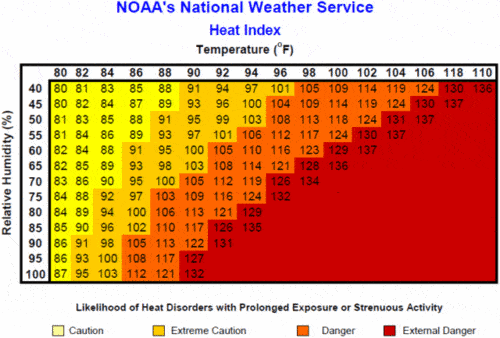
Now, your Clone Self added humidity to his camper in a dry environment, so he feels cooler! Hmmm … maybe … if you take away humidity from your camper in a humid environment … you would feel cooler!
And that is exactly what you should do. You bust out your $300 portable dehumidifier.
A dehumidifier operates on the same thermodynamic cycle as your rooftop A/C or window A/C. Uses many of the same parts, actually.
However, a dehumidifier is optimized to remove water from the air. So it actually heats air to dry out the moisture!
That shouldn’t surprise you. What did we learn earlier? That a “real” AC will always make heat. That’s what a dehumidifier does – but it’s smarter about it.
As the dehumidifier removes moisture from the area, you start to feel cooler. Your sweat is more effective! You can actually breathe!
Yes, the dehumidifier is still adding waste heat to the air. And the water vapor itself is releasing all that latent energy of evaporation as well. So technically, the mercury is rising.
But usually, if it’s hot and humid enough, you get more than you give. The air temperature may climb a few degrees, but you feel much, much cooler.

Do I Really Hate Portable Air Conditioners for RVs?
At the beginning of this article, I said I hated portable A/Cs.
That’s not really true. As you can now see, they all have their purpose! I just hate how the term “air conditioner” is so easily abused.
I can’t tell you how many people have asked me, “Why should I pay hundreds of dollars for [X] air conditioner when I could buy this one for $50?”
And now you know: Because they’re completely different products! A portable RV air conditioner should be chosen carefully.
How to Choose a Portable RV Air Conditioner: Rule of Thumb
- Humid, hot camping = dehumidifier/real air conditioner
- Dry, warm camping = mister/evaporative cooler
An Engineer’s Side Note: What About Thermoelectric Cooling?
Guys, thermoelectric cooling is like magic. It’s unreal.
Here’s the definition from Wikipedia: “Direct conversion of temperature differences to electric voltage and vice versa via a thermocouple.”
All you need is two different metals and some wire – and bam! You have a refrigerator!
Well, a Lilliputian fridge, anyways. Unfortunately, thermoelectric cooling is extremely inefficient. It generates a ton of waste heat! And it’s expensive to scale. So it’s normally used in cheap coolers for college students and long-distance truckers, not for room space coolers.
Are There Any “Real” Portable Air Conditioners for RVs?
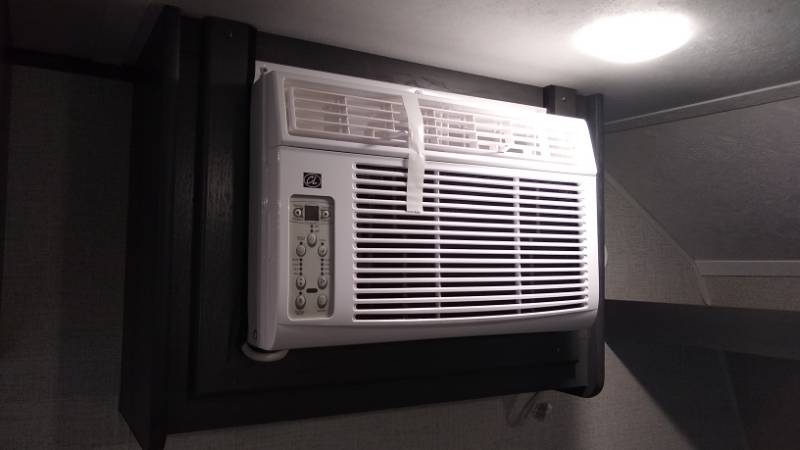
There is, in fact, a third product option.
Here are the “real” best RV portable air conditioners! They have two dead giveaways:
- They are more expensive than evaporative coolers.
- They have a hose or port that vents to the outdoors
Let’s check out three different types.
1. Dehumidifier/AC Combo
Many premium portable dehumidifiers come with a window exhaust kit. The best even come with an exhaust fan and remote control! And yes, you can run these units inside your RV.
- Make sure to vent the heat to the outdoors.
- You’ll need to be plugged into shore power
- Or you’ll need to run a generator.
These are energy hogs, so don’t rely on one for boondocking.
As long as you’re venting the heat outdoors, a reliable and properly sized A/C/dehumidifier should cool your RV almost as well as a standard rooftop unit.
2. ClimateRight Self-Contained A/C
Popular with Tiny Houses and vacation cabin rentals, the ClimateRight A/C is a fully-fledged air conditioner and heat pump that sits outside your unit!
Two hoses, an intake and an outtake, connect your ClimateRight to your RV. You’ll need a window conversion kit, or you’ll need to drill two holes in your RV sidewall.
You’ll also need to set up and break down these units every time you camp. But it only takes 5 minutes.
Update: As of April 2021, ClimateRight is out of stock indefinitely on most of their portable A/Cs. This is likely due to the global supply chain disruptions caused by COVID-19 restrictions.
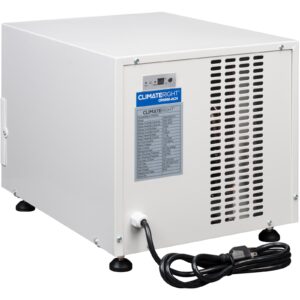
3. Zero Breeze Mark 2
I. Love. This. Thing. If you want a portable A/C that …
- Can be carried in one hand
- Can be charged via solar power and your car cigarette lighter
- Is friggin’ battery-powered!
- Or can be plugged into a wall outlet
- And starts with the push of a button
… then you’ve got to check out the Zero Breeze Mark 2!
Yup, has an inverter-compressor, evaporator, all that good stuff. And it only weighs 16 lbs. It’s a marvel of engineering. I’m jealous.
Which Portable RV Air Conditioner Do I Recommend?
If I stayed at developed campgrounds in a fairly large rig, I would opt for a high-quality combination dehumidifier/A/C. No point buying anything smaller if I have a 32-foot RV to cool down!
Myself, I’m a boondocker. So the Zero Breeze Mark 2 all the way. I often said, “If I had more spare time, I’d invent a REAL portable mini air conditioner.” The engineers at Zero Breeze just beat me to it.
Leave a Reply